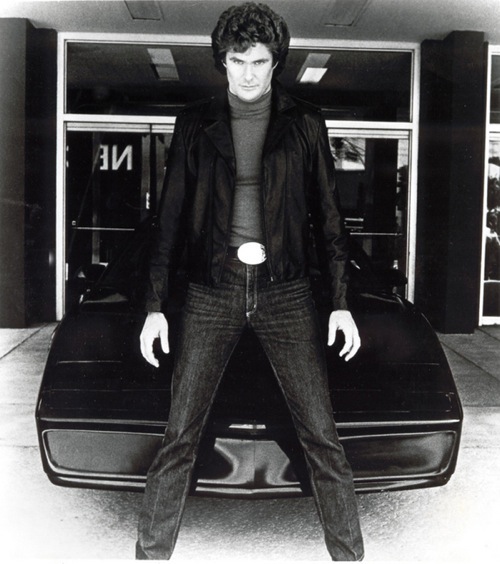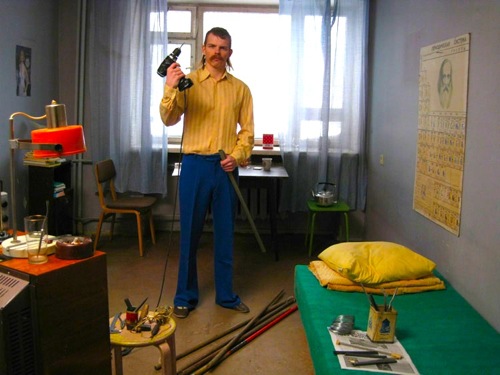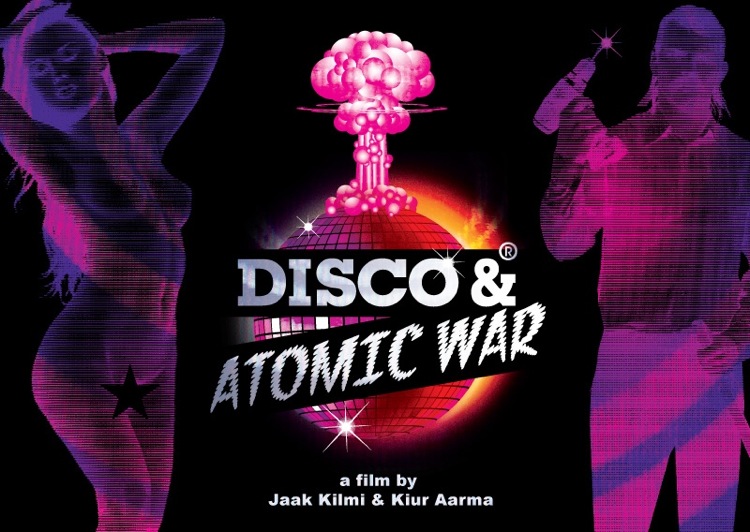[Editor’s Note: LFM is currently covering a series of provocative films debuting this week and next at The Los Angeles Film Festival.]
By Jason Apuzzo. Why, exactly, did the West win the Cold War?
There are many theories. Most of them identify Ronald Reagan’s proposed Strategic Defense Initiative (SDI) or ‘Star Wars’ missile defense system as having been the final tipping point in that epochal conflict, after which point the Soviet Union was no longer capable – militarily, economically, or perhaps even psychologically – of sustaining its Cold War arms race with the United States.
This is certainly true, so far as it goes – and Jaak Kilmi and Kiur Aarma’s extraordinary new documentary Disco & Atomic War certainly credits Reagan’s bold proposal as having had its desired psychological effect on the Soviets. But that isn’t really the story their film exists to tell.
What if the Cold War was instead won … by David Hasselhoff? What if American TV shows like Knight Rider and Dallas, or movies like Star Wars and Ninotchka – or lurid, 70s soft-core erotica like Emmanuelle – played an equal (and perhaps even greater) role in bringing down the communist system? This, essentially, is the subject matter of the compelling and drolly amusing Estonian/Finnish documentary Disco & Atomic War currently showing at The Los Angeles Film Festival (6/20).

Before proceeding further, let me briefly point out that I had the chance to visit Finland and the old Soviet Union during the time period depicted in this documentary – roughly the late 80s. Finland at that time was a kind of strange, anxious no-man’s land – a Western country that was nonetheless very much within the Soviet sphere of influence. As a teenager I remember taking the train from Finland into the Soviet Union, and idly fretting over the fact that I was carrying a paperback copy of Tom Clancy’s thriller The Hunt for Red October in my backpack. Would it get confiscated? Would I be labelled a spy? Would some Red Army jerk put a boot in my face?
If such fears seem quaint now, Disco & Atomic War brings them all back in vivid detail – because the purpose of this documentary is to examine the so-called ‘soft power’ influence of American and Western culture on the minds of Soviet citizens living in Estonia at that time, who were able through clever means to watch Finnish television broadcasts emanating from just over the border. As the film informs us, American popular culture – especially in the form of glamorous TV shows like Dallas – was deeply feared by Soviet authorities due to the ideas and expectations such programming planted in the minds of Soviet citizens.
If what you’re expecting from this film is a dry recitation of Cold War history, though, think again – because Disco & Atomic War is quite simply one of the funniest and most inventive movies I’ve seen in some time. The film wasn’t at all what I was expecting, or what you should expect from what might otherwise be labelled ‘an Estonian/Finnish documentary about the Cold War’ … which on the face of it sounds rather dull. Disco is actually a riot of surprises, a mash-up of historical documentary and personal narrative that attempts to put you into the mind of a young person living in a closed, totalitarian society – who is suddenly and shockingly exposed by bootleg TV antennas to … sex and disco, Texas millionaires, robot super-cars, and Luke Skywalker.

As a young person living in California at the time these things were exciting enough to me … but for young people in Estonia, co-directors Jaak Kilmi and Kiur Aarma make it clear that these pop culture phenomena were nothing short of revolutionary. Disco & Atomic War meticulously re-creates the Estonia of the late 70s-late 80s, which was apparently used by the Soviet regime as a kind of laboratory experiment for determining the exact repercussions of having a population subjected to a steady stream of Western influence.
That’s right. [SPOILER ALERT.] The Soviets secretly allowed the Estonian population to be exposed to Western entertainment emanating from Finland, in order to gauge how their people would respond. It was a dangerous experiment – one that would prove fatal to the communists’ grip on power.
As Kilmi and Aarma tell it, Estonia was a kind of quiet, Soviet backwater state at the time that just happened to find itself in close proximity not only to Finland … but to giant TV towers constructed by the Finns (with, it was understood, U.S. backing) in order to broadcast American entertainment directly into the Evil Empire. And what exactly did these daring, constantly-under-threat Finnish TV stations broadcast into Soviet Estonia? Frothy TV fare like Dallas (a show which, in the eyes of the Estonians, featured “men with brilliant white teeth, and beautiful but unhappy women … in a land where everyone is a millionaire … a captivating, spiritual seance”); or shows featuring dancing girls and discos (the Americans’ “secret weapon”); or late night reruns of Ninotchka, the delightful Greta Garbo-Billy Wilder satire on Soviet bureaucrats. There was also Star Wars, George Lucas’ electrifying spectacle that strangely seemed to prefigure both the collapse of the Soviet evil Empire, and the very means (the ‘Star Wars’ missile defense system) by which that Empire was cowed into defeat.

Nothing seems to have had such a great effect on the Estonians, however, as David Hasselhoff’s Knight Rider series … and also the lurid, 70s nudie classic, Emmanuelle. The two most hilarious sequences in Disco & Atomic War involve recreations of how young Estonian kids would gather around foreign cars and begin speaking into their shiny new digital wrist watches, hoping that the cars would come alive like Hasselhoff’s Pontiac. In a later sequence, we see almost the entire nation of Estonia struggle with antennas (some made of simple metal pipes, others made with mercury from thermometers) in order to catch fleeting glimpses of curvaceous Sylvia Kristel writhe in passion in Emmanuelle.
What Disco & Atomic War captures is how utterly hopeless Soviet efforts were to counteract these seductive Western entertainments … and if you’re sensing some parallels with our current struggle against the Islamo-fascists, you’re right on the money. If you watch films like the recent No One Knows About Persian Cats (see the LFM review here), you will form the inescapable conclusion that Iran’s youth are exactly where Estonia’s were some twenty years ago … watching bootlegged Western music and movies, copping rebellious youth attitudes (including punk music), ignoring state restrictions in their daily quest for sex and excitement. Disco & Atomic War is a kind of visual treatise on this type of ‘soft’ Western power, as opposed to military modes of power, and how utterly explosive these modes of influence can be on shaping the imaginations of a population. As the film relates, it’s probably no coincidence that the same year Dallas reruns stopped playing illicitly on Soviet TV screens, the Soviet Union collapsed. [In fact, in his only on-camera interview since being ousted from office, the Soviet puppet dictator of Estonia directly blames Finnish/Western TV broadcasts for the collapse of his own regime.]
I can’t recommend Disco & Atomic War enough, and if you’re in LA on Sunday, June 20th – and anywhere near the vicinity of the downtown around 10pm – I recommend you pop in and see it. [Click here for more details.] If there’s any justice in the world, the film will be short-listed for Oscar consideration. It will show you a side of the Cold War we don’t hear enough about … and give you a sense of what remains our most potent weapon in the battle against tyranny: the alluring freedom of our popular culture.
I’ve embedded the trailer below – which, unfortunately, does not quite do justice to the baroque wit and sophistication of this magnificent little film.
Posted on June 19th, 2010 at 11:32pm.


I agree with the premise of the film. The sequel, however, should at least mention all that seductive western media is at the bottom of the Islamic revolution’s hatred of the west – and may well have precipitated the present wars.
If so, perhaps we’re fighting with the wrong weapons. Maybe instead of invading Afghanistan, we should have airdropped small, solar charged TVs with their own satlinks broadcasting “Married with Children” in Pashto.
Another option would be “The Real Housewives of New York.”
Thank you very much for that wonderful article
I wish I could see some of these LA film fest. movies where I live. I love the Estonian’s fascination with Dallas and Knight Rider. It just shows you how important it is what kind of popular culture we sent to the rest of the world, and how it can have a good effect if it contains the right values and messages. I’m touched that these American TV shows meant this much to the Estonians. I’m glad they now have freedom and democracy.